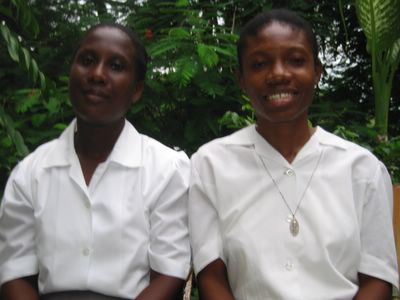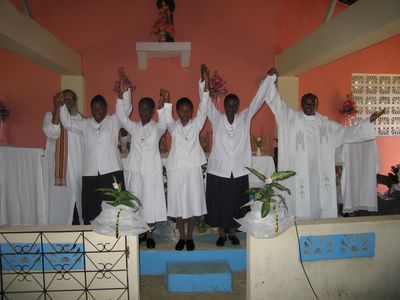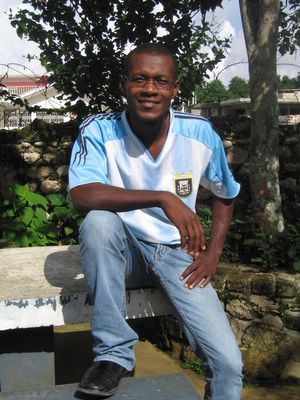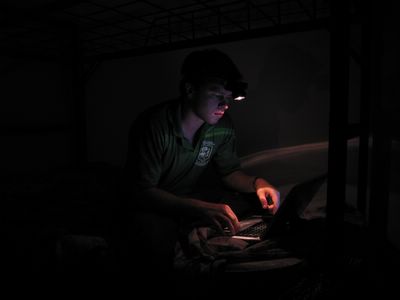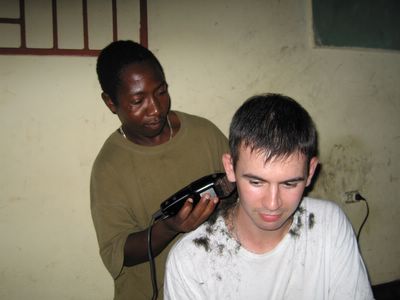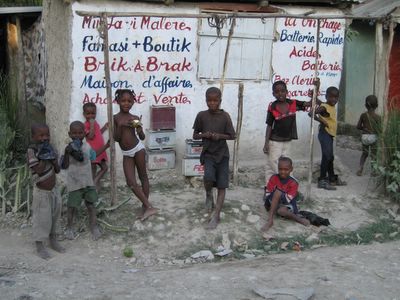Saturday, August 26, 2006
Tales of travel and teaching
These past week or so has been eventful and productive. I spent last Tuesday and Wednesday in
On Sunday I visited Léogane to promote a two-month English conversation class that I will be offering in October and November. During the course I will leave Fondwa Thursday and stay in Léogane through Saturday, teaching on Thursday and Friday afternoons and Saturday mornings. Wednesday I started classes at l’Ecole St. Antoine, the APF’s school in Fondwa. I’m teaching Wednesday and Thursday mornings, 7th grade and 9th grade. On the weekends I also have an hour-long conversation class with the novitiates I live with, and there is no shortage of people asking for more lessons. Once the University students start their internships in October, I will be visiting them with another professor to evaluate their work. At that time, my schedule will officially be chok-a-blok full.
For now, I find I have a fair amount of time to read, relax, and spend time with people. I have become particularly fond of Djet and Julie, a pair of 2 year-old orphans who are too young to live in the orphanage, so they live in the
The coming week will bring many English lessons, a friend’s one-year marriage anniversary party, trips to Léogane and Port-au-Prince, a meeting with USAID, and an over-night stay with a group that does cultural diversity training.
A Community Celebration
Friday, September 30, 2005
Last week brought the 43rd birthday of Sr. Carmelle Voltaire, the director of the guest center where I live. She spent most of the week in a contemplative, near-brooding state that often accompanies the passing of another year, but her personality emerged in full form on the evening of her birthday party. She donned an impressive African gown for the event, which she had received as a gift in the
Whereas dinner around here is usually a bit of oatmeal or some re-heated spaghetti, Sr. Carmelle’s birthday spread consisted of an impressive display of mounds of rice and beans, crispy fried chicken, deep-fried plantains with a spicy vegetable garnish, a colorful assortment of vegetables, sweet potatoes, Haitian-style french fries, and the deep-red sauce that goes with everything. The celebration was begun with a rousing rendition of Happy Birthday in French, English, Spanish, and a Creole-English mélange, along with a champagne toast led by Ciné, Fondwa’s elder statesman. I was a bit surprised at the champagne, what with being in rural
The evening was topped off with a delicious home-made birthday cake and the rare treat of
Drive-Through Market
Friday, September 30, 2005
Last Sunday the sisters and I left Fondwa for a week-long retreat in
In
The marketplace is also mobile. As we drove through
Our final purchase was a bag to put all of our other purchases in, naturally. Sr. Simone saw an older woman selling bags by the side of the road and called out “Pssssst,” the Haitian version of ‘hey you!’ Belying her advanced age, the woman took off on a sprint, avoiding other cars and the garbage in the street in her bare feet, and nimbly hopped aboard our truck. Sr. Simone referred to her as “my aunt” as they began to barter, the preferred means of exchange for most all transactions. As the bartering heated up, Sr. Simone changed to calling her “dear,” until finally she arrived at her final price and said “take it or leave it lady.” The sisters may be gentle souls, but they’re not about to get taken in
Retreat in Port-au-Prince
Friday, September 30, 2005
I have spent this whole week in
I have been translating for Fr. McKnight, an African-American Spiritan priest from
Translating personal reflections has been no problem, but putting the wisdom of esteemed theologian Ronald Neibuhr or the philosophical insights of scientist Max Plank into Creole (on the spot no less) has my head spinning. At least I know that after spending a week with these deeply spiritual people I can’t help but have a bit of positive energy rub off on me.
Hey, that smells almost like...
Wednesday, October 05, 2005
On Saturday I accompanied Missy, the other American volunteer in Fondwa, to Jacmel, where she had some mail to pick up. Jacmel is a cozy town by the sea with some impressive colonial-era architecture, a thriving arts scene, and many beautiful beaches. I usually have a relaxing and enjoyable experience when I go to Jacmel; this time, I got more than I bargained for.
After trekking up the mountain to Anbatwanel, Missy and I climbed aboard an already fully-loaded bus heading for the Southern coast. A warm day becomes even warmer when there are that many bodies stacked on top of each other, and the bus was by no means immune to day’s hot sun. When a group of young men started running after the bus flailing their arms, the driver caught on that something was wrong. As he pulled over to the side of the road, an all-consuming pungent smell enveloped the bus; it smelled almost like… burning tires. The bus’s left rear tire was in flames, and there was a stampede to escape out the back door. I managed to get out by flowing with the tide of frightened passengers.
The driver stepped down to take in the situation, and determined that the wheel wasn’t doing so bad. After all, it was now only smoking, not flaming. He decided to give it a go, and there was another stampede to get back on the bus as it started to move again. Not being Haitian, I didn’t have the killer instinct necessary to force my way through the crowd of people amassed at the back entrance; even though there was room enough for everyone in the bus, people were staying near the exit in case of another emergency. The bus picked up speed, and I ran after it day pack and all, finally managing to jump on the back bumper and cling to the roof for dear life. It wasn’t so inconvenient in the end, because, predictably, the tire started burning just a bit down the road. Missy and I decided to walk to rest of the way, convinced by the second burst of flames that staying with the bus was not going to lead to a relaxing and enjoyable experience.
The meaning of homemade
Wednesday, October 05, 2005
Tuesday brought an occasion that the Sisters have been looking forward to for months. Sister Melicia and Sister Claudette took their temporary vows, the first two novices to do so in the newly-founded Sisters of St. Anthony of Fondwa. It has been nine years since Fr. Joseph founded the congregation, and after a few false starts the community finally has its first full members.
The ceremony took place in the St. Anthony Church, 10 minutes down the road from the
Though they don’t have many material resources, the Sisters pulled out all the stops for this grand occasion. The church was beautifully decorated with flowers and ribbons, and six older gentlemen sported colorful hand-crafted “Welcome” signs to greet the invitees. The greatest production was the reception that followed, during which 300 people were served a full meal of beans and rice, turkey, goat, fried plantains, eggplant à la Française, salad, french fries, and popcorn. The popcorn seemed a bit out of place to me, but it’s a sort of delicacy because they prepare it so rarely. Another small touch was yellow mustard, which didn’t really go with anything but made the event just a bit more fancy. Everything, and I mean everything, came down to the last minute (in true Haitian style), but somehow it all came together and everyone seemed to enjoy the feast.
The whole ordeal was capped off by not one but four impressive cakes. In the two days that I observed the baking of these cakes (that’s right, a full two days), I came to a new understanding of the term ‘homemade.’ The process included hours of beating the butter, sugar, milk, eggs, flower, and rum in a large tub with a flat stick, then cooking each cake one-by-one in a small oven, and finally decorating them elegantly with an improvised icing. After participating for just a few minutes in the beating stage, I have half a mind to write Betty Crocker about how she mislabels her products as homemade. I now know that homemade means that you hurt after you bake it, and the only remedy is the sweet taste of the final product. And oh, how sweet it was.
Hérault Beauvais
Thursday, October 06, 2005
Hérault Beauvais, a native of Fondwa, serves as the APF’s Fondwa-Port-au-Prince liaison. He was born 33 years ago in his family’s humble dirt floor home, the youngest of three children. After completing his primary school in Fondwa, Hérault went to
During his secondary studies he sought to augment his education with practical training through two-year courses of study in auto mechanics and men’s apparel. After receiving his high school degree, he undertook two years of study in accounting. He then had the chance to participate in an exchange program in
Hérault has been involved with the
Aménold Pierre
Friday, October 07, 2005
Aménold Pierre, 29 years old, is from La Vallée Jacmel, near the Southern coast of
After completing his primary studies in La Vallée, he went to
Upon graduating in 2003, he returned to
Amenold has big plans for UNIF and his home community of La Vallée. He currently has a weekly radio program called ‘An Evening of Agriculture,’ and is the General Director of an organization called ‘Movement for the Economic Recovery of La Vallée.’ His professional interest is the business aspect of agriculture; he has already started a technical school in La Vallée, and would eventually like to do a Masters in Environmental Management. Of UNIF, he says that it can be a model of sustainable economic development both for
Tying the knot
Last week Anne and Laurent, a French couple that has been working in Fondwa for two years, were married in the French Embassy in
The day after the wedding, they invited many of their friends to celebrate the occasion with a party on the beach in Jacmel. They rented a yellow school bus to pick everyone up, and we all went together. There was plenty of food, drink, and dancing, enough to last through the night. I ended up strewn across four chairs by the time everything wrapped up at 5 in the morning, but the more adventurous souls kept the party going. Below are a few photos that capture the eclectic nature of the evening. I guess there's nothing quite like tying the knot in
Manouche Douze
Tuesday, October 18, 2005
Manouche Douze is one of UNIF’s four students from Mirebalais, in
The residents of Gran Boucan have a number of challenges to confront together as well. Manouche describes the area as greatly lacking in infrastructure, schools, and health care. Simple necessities such as latrines and potable water remain all too elusive. “Still,” she says, “it’s where I come from, and I want to participate in its development.” Toward that end, Manouche brought together 40 members of her community in 2004 to found APGN, the Peasant Association of Gran Boucan. Founding the organization is just one step in her efforts to improve the conditions of her hometown that will continue after she receives her degree in Agronomy from UNIF.
Manouche appreciates the professional skills she is learning at UNIF, with practical work and studying in 4 languages complementing her normal course of study. As to where she will put those skills into use, she says “I come from a rural area, and I can’t ignore that in
Charles Edner
Wednesday, October 19, 2005
As the son of peasant farmers from the Northern town of
Education is always a sacrifice in
Because of his rural upbringing, Charles finds that he has a close relationship with other peasants, which is essential for his studies in Agronomy. Thanks to UNIF’s rural setting, “we have more contact with farmers and their work. When you go to
Reinforcements
When he arrived on Saturday, Dan had a typically Haitian introduction to his new surroundings. American Airlines managed to lose his luggage between
The picture above is from Dan's first experience of our working conditions in the
The Fondwa Barbershop
Above is a photo of Fondwa's barbershop, which is located wherever Yves can plug in his clippers. There isn't much competition around these parts, because most people simply take a naked blade from a razor and start scraping. As hesitant as I was to let Yves experiment on his only white client, I wasn't about to put my life in the hands of a stranger with a Bick. With some minor post-haircut adjustments, I think it turned out just fine. And not a single life-threatening injury to boot.
Destination: Paradise
Sunday, October 23, 2005
If you can't see it, there is a tropical paradise hidden in the lush vegetation featured above. Missy, Dan and I went to a place called Cyvadier Plage on Saturday, a destination that includes a top-notch restaurant, hotel rooms (for those hoards of tourists in
In Dan's one week here, he has experienced the heat and squalor of
What Role for Women in our Communities?
Sunday, October 23, 2005
A reflection from UNIF’s female students
It is clear that women play a central role in our communities. Looking back at
Today, we are experiencing a change in the place of women in Haitian society. As we see with the current elections, it is possible for women to run competitively in political races. As is evident from the number of women in UNIF’s founding class, it is possible for women to go to university and work for the future of this country. Rather than accepting the lot of their communities, Haitian women are forming associations to transform them. In recognition of the perils of a society in transition, women come together to protect the rights of other women. Women can become presidents of organizations, managers of businesses, and leaders of communities.
A true piece of Fondwa history
Wednesday, November 09, 2005
Last week I was introduced to a genuine piece of Fondwa history. Early Friday morning I set out on a trek along with Eugenio, Danny, and Missy that eventually took us down to the depths of the Fondwa valley, across a river at two points, and up the slippery slope of the mountain on the other side. Our destination was the house of Minik Nocent, the first President of the Peasant Association of Fondwa (APF), which founded the university I work for.
Minik was born in Fondwa in 1934, the last year of the 19-year American occupation of
The group, which included two of Minik’s children as well, decided to form an association, which the called the Asosyasyon Peyizan Fondwa. Their first move was to construct a small building for meetings with a bit of money that they each put into a common fund. All they could afford was wooden poles and coconut leaves, but as they say in Creole, “A house of leaves can’t block the rain, but at least it can block the sun.”
After that, the 9-member committee decided that if there was no road to Fondwa, there would never be development. The still didn’t have money, but the residents of the region came out in force to participate in a project that responded to their needs. Nine groups of twenty people each began work on the road, which was built with picks and hard labor. Today part of the road had been paved with help of the Inter-American Development Bank, and it serves as Fondwa’s access point to the major highway that crosses the mountain above.
The APF soon began working on the most pressing issues facing Fondwa peasants, such as tapping water sources, reforestation projects, and providing agricultural formation. They looked abroad for help from the beginning, working with international NGOs that had
Minik’s son Ismit, also a former President of the APF, participated in a prayer group around the time of the APF’s founding. The group wanted to get involved in the development work that was going on, so they put 15 gourdes together and thought about what kind of a project they carry out. They decided to buy tobacco in bulk and sell it in small sacks, so they chose a ti machann (market woman) to sell the tobacco at market. They counted on doubling their money, but hadn’t counted on the ti machann’s husband smoking all of the tobacco. It took months to get the money back, but when they finally did a new ti machann was able to make 45 gourdes.
One of the group members took the money to buy soap, again ostensibly to sell at market. She ended up using it to do her washing, and the group was only able to get 25 gourdes back. The other members, refusing to be discouraged, continued to put money into a common fund and approached Fr. Joseph for help. He helped them find 500 Haitian dollars (2,500 gourdes) to begin a real cooperative, which today has 200 clients and has offered nearly 700,000 gourdes worth of credit this year. The path isn’t always straight and narrow in Fondwa, but that’s only because we have to build it with picks and hard labor.
Funny, but wrong
Wednesday, November 09, 2005
I recently gave a test to my 7th and 9th grade English classes. Most of the kids passed, either because of my superior teaching skills or because I just didn’t have the heart to fail them. Here are some of my favorite responses:
When is your brother’s birthday?
- My brother’s birthday is the 12th in 1890
Translate the following question: Ki jan ou santi ko ou? (The answer is ‘How is your heath?)
- Where is your body?
What do you think about deforestation?
- It makes me happy
What should people wear during the summer in
- An umbrella
I have finished teaching in the school, because next week I will begin visiting UNIF students where they are doing internships. I’m happy because I get to see most of the country, but my students were a bit upset: “you make me cry!”
It takes all sorts
Dan and I took another trip to Léogane on Friday to accompany Missy as she checked her mail. We waited along the highway for 2 hours, but all of the buses that came by were chock-a-block full. A nice SUV with some white people inside drove by, so I flagged it down to try my luck. They agreed to give us a ‘wou lib,’ or free ride.
I have gotten rides to Jacmel in private cars three times now, and each has been a unique experience. The first time was with a doctor who worked with a nursing school that has campuses throughout
The last time was even more interesting, because we were picked up by a pair of missionaries, one from
Students come to campus
Wednesday, November 09, 2005
The students came to campus October 10th-14th to prepare for the internship period, which goes from October 17th through mid-February. It was my first opportunity to meet most of the students, which was a great pleasure. They are a very close-knit group, which would tend to happen in a university with only 20 students. During the course of the week we went over the internship requirements, had a few lectures to help them with specific tasks, and met with Fr. McKnight, UNIF’s spiritual director. It was my job to translate, because Fr. McKnight, who is from
I also had the chance to interview many of the students and take their photos; the biographies and articles that I wrote can be found on UNIF’s website, www.unif2004.org.
Thursday, August 24, 2006
The Challenges of Today Become the Progress of Tomorrow
Thursday, November 10, 2005
(From the
I decided to spend my first year out of college in
There has been no shortage of obstacles to achieving my goals. Communications can be difficult because the cell phone network doesn’t reach our valley, a lack of electricity prohibits internet access through even the most advanced satellite technology, and the nearest post office is two hours and a large headache away. The Haitian custom of warmly greeting each person you encounter at the office is much appreciated, but it can be a burden when there is much work to be done. Even seemingly unrelated problems can be a hindrance; it is tough to work well when there isn’t any water to bathe with, or when hunger sets in because rice and beans have been served for the 83rd consecutive day (and counting).
Mother Nature has her own unique role to play in this game. When tropical storm-force rains hit
As daunting as these challenges may be, they pale in the face of the daily struggles of the peasants of Fondwa. My work hardly compares to their own, toiling under the hot
The Peasant Association of Fondwa (APF), which founded the university I work for, was created in 1988 by local farmers to take on these challenges together. It seems that what allows the members to overcome the myriad difficulties they face is the fact that they have a common goal, the goal of promoting the well-being of the community.
What continues to impress me is the relentlessness with which they pursue that goal, regardless of the numerous difficulties that lie before them. With each milestone that is reached through the efforts of the APF, like the construction of the local school and orphanage, planting of trees, and planning of model farms, the solidarity of the group increases. The more they accomplish as a group, the greater their capacity to work together becomes.
In the same way, I have found that my personal challenges have been a necessary stepping-stone to completing the work that I have been given to do. Without them, I would have no basis for understanding the problems of the people I have come to live with. If it were easy to build a university in the mountains of
Dancing. With vigor.
Tuesday, November 22, 2005
Each time I set out on a trip in public transportation, I think I know what I’m getting myself into. I am always mistaken. On Wednesday I went to the station where buses leave for the South with Vital, a professor of Agronomy with UNIF. We found a bus for Aux Cayes, where two students are doing internships, and I settled into a seemingly benign seat near the front of the bus. My seat became infinitely smaller a moment later when a grandmother of generous proportions took up residence beside me. It may not have been so bad, but it just so happened that she was in the dancing mood. As the bus pulled out of the station and the same Kompa music that plays in all buses started blaring from the front speakers, granny started moving to the beat. With vigor.
When we finally arrived at Aux Cayes many, many hours later, I was ready for a break. Vital had a place to stay with a friend, but there wasn’t room for two so I had to find a hotel. The hotel manager instantly recognized the potential for a large payday, asking the foreigner for 100 Haitian dollars (about $25US) per night. I later did some investigating and found the real price to be about one-fifth that price, and some intense negotiating led to a significant discount from the blan rate.
Aux Cayes is
Given the way things are in
Vital, who was doing an evaluation of the internship for UNIF, remarked that Chouloute was getting practical experience in subjects that usually aren’t studied until the 5th year of university. What I took away from the visit was the fact that Chouloute is willing to live away from home, make a long voyage each day, and work in a poor rural setting during an unpaid internship.
Thanks for the colorful travelog!
Two things I found very hopeful in your report (which things, of course, are never mentioned in US media):
- that
- that even more important, it has people who are altruistic and actually making a difference
Always like to find out this sort of affirmations!
Cap Haitian, a City of History
Tuesday, November 29, 2005
This past weekend I had the opportunity to visit Cap Haitian, located on the Northern coast of
It was in 1670 that Cap Francois (as it was then known) became the administrative center of the French-controlled part of
Dessalines became the Emperor of Haiti in 1804, but he was killed just two years later. At that time the country was split in two, with General Alexendre Pétion ruling the South and General Henri Christophe taking over the North. Christophe rebuilt the re-named Cap Haitian, which became his capital, to some of its former glory. His most impressive achievements were his castle, the Palais Sans Souci, which is said to have rivaled
Sadly, today Cap Haitian is an over-crowded city with a crumbling infrastructure that the government shows no interest in improving. As is usually the case, it is up to the local peasants and non-governmental organizations to find a way to confront the problems of the area. One organization that is taking an innovative approach is Veterimed, a Haitian NGO founded in 1999 in the nearby town of


